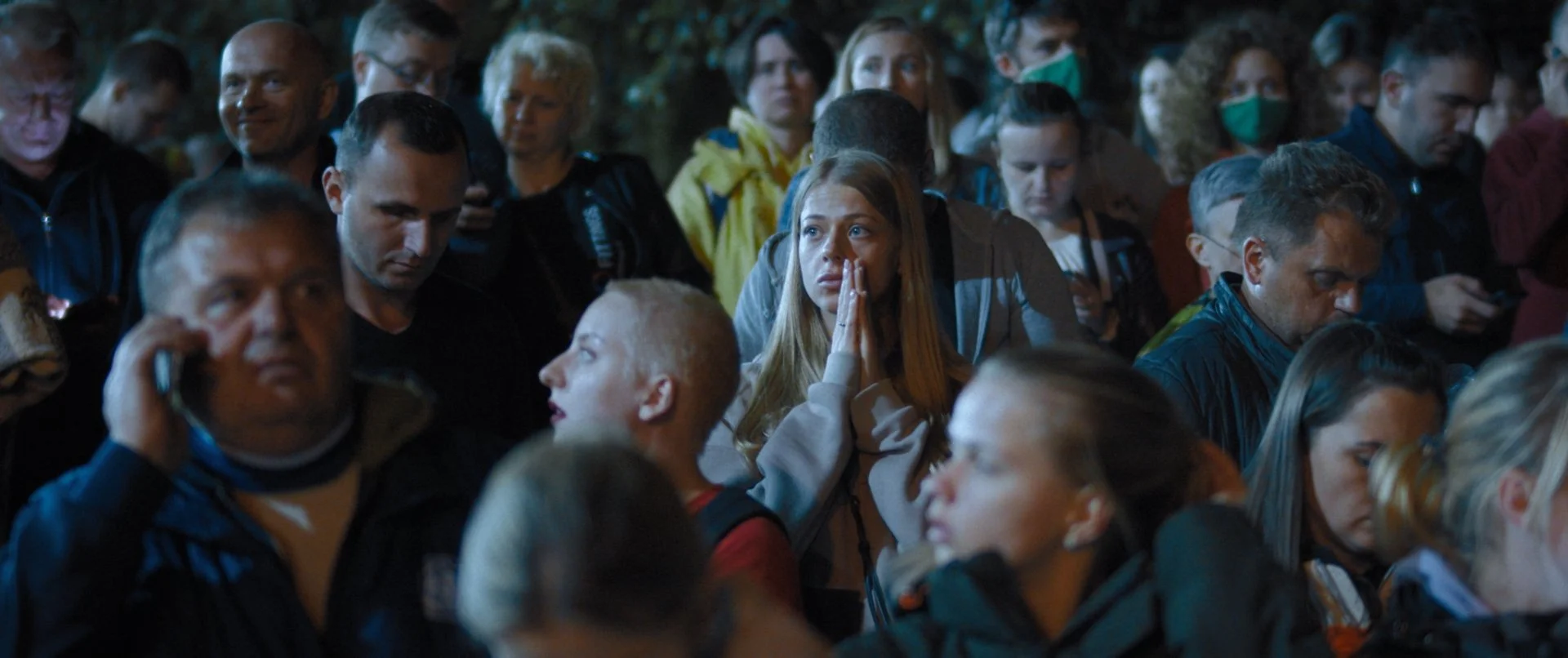Performance and Grassroots Activism in Aliaksei Paluyan’s Courage (2021)
How often do you see a documentary that portrays a revolution by filming theater actors in their daily lives and on stage? Premiered at the 71st Berlin International Film Festival, Aliaksei Paluyan’s feature-length documentary debut Courage (2021) is a directorial statement in and of itself. It narrates the events surrounding the rigged presidential elections, which took place in Belarus in August 2020, through the eyes of a theater troupe caught up in the nationwide protest movement while staging a political performance of their own. For Belarusian-born and German-trained Paluyan, this is his second film longlisted for the Academy Awards after Lake of Happiness (2019), a short about a Belarusian village girl, Jasja, who runs away from an orphanage after being abandoned by her father. In Courage, it is the entire country that abandons its self-proclaimed father figure: Alexander Lukashenka, a man who has retained his power since 1996 by mending the existing laws, allegedly falsifying election results, and ruthlessly persecuting his political opponents.
Courage addresses the underlying political trauma of Belarusian society through performative practices, such as the theatrical rehearsals and protest scenes that punctuate the film, or the play performed in the film’s finale. The featured theatrical troupe is none other than Belarus Free Theater, the legendary company founded in 2005 by Nikolai Khalezin and Natalia Kolyada, who communicate to their Minsk-based actors via Zoom during the rehearsals. By structuring his documentary around the renowned theater company, the director built on a pre-existing audience base and successfully reached out to new viewers. Discover Love, the play that they are staging, addresses the state-sponsored violence of the 1990s. It narrates the story of Anatoly Krassovsky, a businessman who disappeared and was murdered by the Lukashenka regime in 1999. Together with the 1990s documentary footage used in the prologue, this appeal to the older Belarusian narratives of state violence and activism frames the present-day pro-democracy movement in the country within a broader historical narrative.
The trajectories of the film’s lead actors –– Marina Yakubovich, Pavel Haradnizky, and Denis Tarasenka –– help bridge the private/public divide by showing their daily lives and interactions with their friends and family during the present-day social upheavals. These conversations are the core of the film and represent the protesters' archetypes. Take, for example, the scene where Marina and her husband discuss the possibility of joining the protest, weighing the outcomes for their baby: to go out to protest so that their kid can grow up in a free country, to stay home for their safety, or to immigrate. The dilemmas faced by Belarusian parents in this particular movie are universal and, in our time of global protest movements, these concerns resonate across the world.
For viewers with ties to Belarus who were not in Minsk during the aforementioned events, it is also an opportunity to see the city streets on the big screen, which makes the viewing especially poignant. During the protests, there were only a handful of professional cameras and cameramen on the street in Minsk. As the Belarusian regime significantly hindered the work of journalists, many watched the news through the frenzy of videos uploaded to Telegram channels by users across the country. Following the regime’s eradication of the memories of the revolution, much of that protest footage has been lost. After all the arrested servers, seized phones, and deleted materials, the film’s witnessing of the events of 2020 is all the more valuable. Additionally, for Belarusian diasporas, the film screenings themselves have become a form of grassroots activism. From Berlin to Los Angeles, local diaspora activists show up at the movie theaters holding portraits of their country’s political prisoners. Watching Courage in movie theaters across the world, Belarusians see not only familiar places and events captured by two excellent cinematographers (Jesse Mazuch and Tanya Haurylchyk), but they also catch familiar faces in the crowd. The joy of recognizing loved ones on-screen is quickly submerged by the anxiety that this footage poses a real danger to the activists remaining in the country. After the protests’ brutal suppression, every voice that speaks in support of Belarus, drawing the world’s attention to the atrocious situation in the country, bears responsibility for their loved ones on the ground.
Courage by Aliaksei Paluyan deserves a special place in the gallery of films about revolutions because it portrays a revolution that, unfortunately, did not succeed in overthrowing its mustachioed tyrant. Unlike some of the most iconic cinematic revolutionary myths of the 20th century, the production and post-production of Courage took place during the event, not years after, and therefore cannot offer a reflective distance, leaving the film’s plot-line open-ended. Instead of chronicling the events, the film attempts to chronicle how people's feelings changed during the protests. Indeed, as professional observers of emotions, actors have a knack for teaching audiences about their own. This is exactly what Nikolai Khalezin talks to his actors about on-screen during one of the Zoom sessions, asking the actors to write diaries reflecting on the events, because they “can’t go on stage with their past.” Belarusian viewers cannot help but to connect and reflect on their own feelings, locating their personal experience in the film’s wider context of the struggle against the dictatorial regime of Alexander Lukashenka. Regardless of the cinema-goer’s nationality, our emotional labor is part and parcel of the paradigmatic shift in protest movements across the world. It is essential not only to processing this particular documentary but also to working through the trauma that so many protest communities worldwide have experienced.



